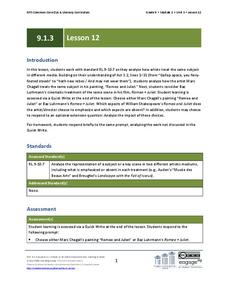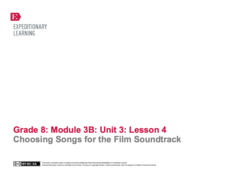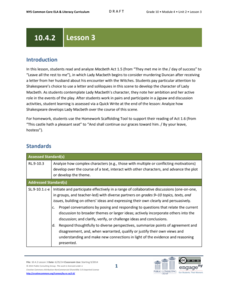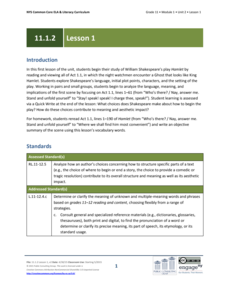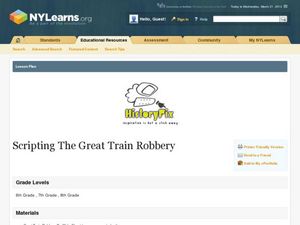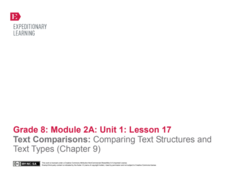EngageNY
Grade 10 ELA Module 4, Unit 2, Lesson 25
How do film adaptations differ from their literary counterparts? Scholars watch and analyze the 2011 Royal Shakespeare Company (RSC) production of Shakespeare's Macbeth. Pupils complete a Quick Write analyzing how the RSC production...
EngageNY
Grade 9 ELA Module 1: Unit 3, Lesson 12
Marc Chagall's painting Romeo and Juliet and Baz Lurhmann's film of the same scene in Romeo + Juliet allow class members to analyze how artists consider the same subject in different media.
EngageNY
Grade 9 ELA Module 3, Unit 1, Lesson 7
Sometimes, the movie version of a book can provide additional details about the source material, particularly when the film is thoughtfully directed and well-acted. Ninth graders watch a two-minute clip from the movie Temple Grandin and...
EngageNY
Grade 10 ELA Module 4, Unit 2, Lesson 24
What might viewers notice about the characters, setting, and cinematic choices in the movie version of a play? Pupils view an excerpt from Throne of Blood, Akira Kurosawa's film adaptation of Shakespeare's Macbeth. To finish the lesson,...
EngageNY
End of Unit Assessment: Text to Film Comparison
Scholars work on an end-of-unit assessment to put all of their learning together. They complete short answer questions about gist, multiple choice questions about A Midsummer Night's Dream, and complete graphic organizers comparing film...
EngageNY
Text to Film Comparison: Bottom the Fool
Pretty ugly, jumbo shrimp. Oxymorons are awfully good! Scholars reread Act I, scene 2 from Shakespeare's A Midsummer Night's Dream while participating in a drama circle. Next, they begin working on anchor charts to dissect Shakespeare's...
EngageNY
Grade 10 ELA Module 1: Unit 3, Lesson 7
Track character development with an excerpt from Amy Tan's The Joy Luck Club. As tenth graders examine the relationship between Jing-Mei and her mother, they compare both characters' expectations of each other in the chapter "Two Kinds."
EngageNY
Choosing Songs for the Film Soundtrack
Music has the power to bring topics alive. Learners take on the role of sound director in their film planning and choose the songs to accompany their photographs. They must also support their decisions with evidence and reasoning as they...
EngageNY
End of Unit 3 Assessment: On-Demand Writing— Photograph and Song Choices for a Film
Ready, set, write! Every great film begins with a script, and every presentation starts with a plan. Directors use their research and experience to compose an essay explaining the rationale behind their film's musical and visual choices...
EngageNY
Text to Film Comparison: Bottom’s Transformation
Scholars meet in a drama circle to discuss what they remember from reading A Midsummer Night's Dream Act III, Scene 1 in the last activity. They then take turns reading the scene aloud, stopping to answer questions as they read. Learners...
EngageNY
Grade 9 ELA Module 1: Unit 3, Lesson 16
"Thus, with a kiss, I die." After viewing a film clip of the events leading up to Romeo's suicide, class members analyze Act 5, scene 3, lines 88-120, in which Romeo drinks the apothecary's poison.
EngageNY
Final Performance Task: Presentation of Photograph and Song Selections
The presentation is the thing. Learners combine all their skills by creating a pitch for their films about the Little Rock Nine. They explain to classmates why they selected the images and songs using self-created prompt cards. The end...
EngageNY
Grade 10 ELA Module 4, Unit 2, Lesson 26
How do directors' choices emphasize different elements of a drama? Scholars participate in a discussion about the Royal Shakespeare Company production of Macbeth and Akira Kurosawa's Throne of Blood. Finally, they write an analysis of...
EngageNY
Grade 9 ELA Module 1: Unit 3, Lesson 20
The final session in this 20-lesson plan unit asks individuals to use their Quick Writes, discussion notes, worksheets, and annotated text to craft and support a claim about how Shakespeare develops either Romeo or Juliet as tragic heroes.
EngageNY
Grade 10 ELA Module 4: Unit 2, Lesson 3
How does Lady Macbeth's ambition help advance the plot of Shakespeare's Macbeth? Scholars explore the topic using discussion and a jigsaw activity. Next, they complete a quick write to analyze how Shakespeare develops Lady Macbeth's...
EngageNY
Grade 11 ELA Module 1: Unit 3, Lesson 3
Virginia Woolf didn't believe a woman could have written Shakespeare's works. Using the resource, scholars engage in a silent discussion to analyze how Woolf uses rhetoric to convey her point of view in A Room of One's Own. Pupils write...
EngageNY
Grade 11 ELA Module 1: Unit 2, Lesson 22
Scholars explore Act 5.2 of Shakespeare's Hamlet, in which Hamlet and Laertes injure each other with a poisoned blade. To finish the lesson plan, pupils also write about two central ideas from the play.
EngageNY
Grade 11 ELA Module 1: Unit 2, Lesson 1
How can an author's decisions impact a text? Using an insightful resource, scholars begin their study of Hamlet by reading Act 1.1. They explore the language, characters, and setting in small groups. Upon finishing group work, pupils...
EngageNY
Grade 12 ELA Module 1: Unit 1, Lesson 1
Here's a fresh approach to the dreaded personal narrative required by most college applications. The Autobiography of Malcolm X is the anchor text for a unit that, through modeling and guided practice exercises, encourages the...
Curated OER
Hollywood Magic-The Dream Factory Recreates the Novel
The Great Gatsby, The Jungle and study HRC's Teaching the American Twenties-The Dream Factory are the focus of this lesson, Your learners will rewrite a small scene from the novel into a dramatic film scene and then create a modern...
EngageNY
Text to Film Comparison: Taking a Stand at the Jailhouse (Chapters 14-15)
Readers look closely at Scout in chapter 15 of To Kill A Mockingbird. Learners use turn and talk and Analyzing Scout's and the Reader's Perspectives Note-catcher to compare their perspectives to Scout's. They then make a comparison to...
EngageNY
Mid Unit 2 Assessment: Text to Film and Perspective Comparison of to Kill a Mockingbird (Chapter 18 and One Scene from Chapter 19)
Have you ever heard someone say the movie is not like the book? Scholars complete a mid-unit assessment to compare scenes from the novel To Kill a Mockingbird to the movie version. The assessment contains short answers, multiple choice,...
Curated OER
Scripting The Great Train Robbery
Take writing prompts to another level in this activity, which allows pupils to create scenes of dialogue based on the 1903 silent film, The Great Train Robbery. Useful for a language arts/history cross-curricular activity, the lesson...
EngageNY
Text Comparisons: Comparing Text Structures and Text Types (Chapter 9)
Scholars revisit the comparisons they made in the previous lesson of "Incident" and To Kill A Mockingbird. They talk with their discussion appointment partners about the structure of a narrative and use a Compare and Contrast Note...

